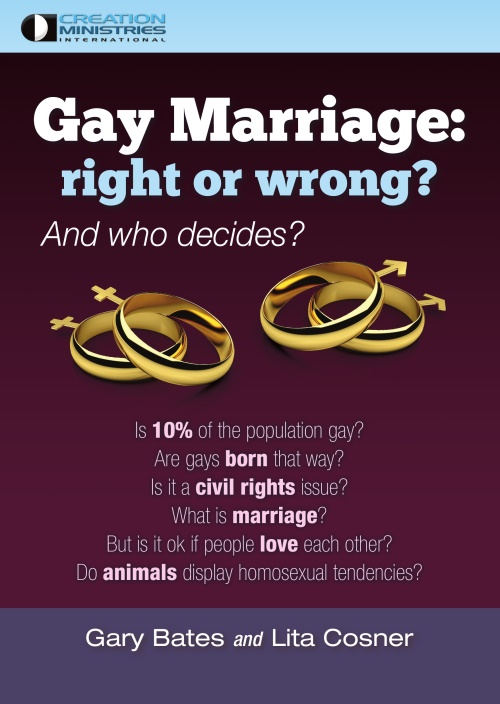Feedback archive → Feedback 2014
Feedback: The Trinity vs Unitarianism, and explaining the Bible on homosexual behavior

D.L. wrote in from the US:
Dear Creation Ministries,
We have some friends who claim to be Unitarians. Our family is of the Christian faith and we have shared scriptures and cds on our faith. What are your thoughts on the subject and on this site [URL removed].
We know that their hearts are going to have to be opened to the truth. We are just wanting to be sure that we are doing all we can to help that. We are here on this earth to serve God to all His people.
Thank you so much for your time.
CMI-US’s Lita Sanders answers:
Dear Dawn,
Thanks for writing in. The article on the Unitarian page is too long to address every claim in detail, but to answer a few of the key points:
“We cannot understand the concept of the Trinity, so we have to resort to an unbiblical concept of ‘mystery’.”
In fact, the Bible itself says that God is in some sense unknowable, because He is so far beyond us; see Isaiah 55 and Psalm 50:21, for instance. What He reveals to us in Scripture is completely true, but is not an exhaustive revelation of His character. However, I don’t know anyone who claims we cannot understand the Trinity at all. But regardless of whether we can fully comprehend this doctrine, we can apprehend the fact that Scripture teaches it.
“There would not be so many mentions of the Father and the Son without the Holy Spirit if the Holy Spirit were a person”.
This conclusion simply does not follow from the premise. To the contrary, Matthew 28:19 and 2 Corinthians 13:14 make no sense if “Holy Spirit” were simply another name for “Father”; neither would Luke 11:13, John 14:26, Acts 10:38. Also, a Bible search will reveal lots of times where “Jesus” or “Lord” is used with Holy Spirit, but not God or Father. (Outside of the Gospels, Lord (kyrios) usually refers to Jesus, while God (theos) usually refers to the Father—though there are exceptions to this rule. This does not mean that Jesus is not God, because kyrios is used for Jesus even in cases where it is obviously translating the Hebrew “Yahweh”.) This obviously doesn’t mean the Father isn’t a Person.
“The doctrine of the Trinity makes otherwise simple verses complicated.”
Actually, looking at any mainstream evangelical Bible commentary will give simple explanations for any of the verses in that list. To just address one: in Acts 2:36, Peter says, “God has made this Jesus, whom you crucified, both Lord and Christ.” The unitarian would say this verse is saying, “God made the man Jesus.” However, the meaning is quite different. The text is saying that the Father made Jesus the Christ—the Messiah who would save His people from their sins. The Son was God from eternity past, but He became our Savior and Lord through His death and resurrection.
“The Trinitarian Jesus is a contradiction”.
I would actually agree that many ‘average Christians’ are confused about how Jesus’ divine and human natures interact in the incarnation. This, however, does not invalidate the doctrine. During His time on Earth, Jesus lived a perfect human life so that He could impart a perfect human righteousness to us. This means that when He laid aside His divine power and privilege (temporarily and voluntarily), He did so completely. To illustrate the point: what was the point of Satan tempting Jesus to turn stones into bread? Why would it have been wrong? If some human technology were discovered that allowed us to turn dirt into edible food, it would be hailed as an end to world hunger. The temptation was for Jesus to bypass the human inconvenience and discomfort—to use His divine power as a ‘get out of jail free’ card. And if Jesus had done that, it would have been the end of the Messianic scheme, because Jesus would no longer have lived a purely human life. Even His miracles were done through the Holy Spirit, and not by Himself acting alone. So in the Gospels, we see Jesus as a man, living a perfect human life. This means that He is still a meaningful example for the Christian. However, there are many, many Scriptures which assert the deity of Christ: for instance, John 1 calls Jesus “the unique God who is at the Father’s side”.
I hope this helps.
S.C. from the US writes:
I tried looking on your website, but I couldn’t find the answer to my question. We know that the Old Testament says that both parties who commit a homosexual act must be put to death (Leviticus 20:13).
However, when I read the New Testament, Where Jesus tells His apostles to spread the Gospel to the world, surely the apostles must’ve come across homosexuals in their time, as evidenced in scripture (1 Corinthians 6:9–11). I know that the early church couldn’t have issued the death penalty to homosexuals in New Testament times, for those and other people were the ones they were trying to reach. And surely we, the church, wouldn’t execute homosexuals today!
My question is this: What in the world made homosexual acts no longer an offense that’s to be met with capital punishment?
If they were to be stoned in OT times, why not in NT times and the present? I need to be prepared to give a detailed answer for those citing Lev.20:13 to “prove” that the Bible is immoral.
Thanks for your help!
Lita Sanders answers:
Thanks for writing in. Some people mockingly ask about the penalties given in the Torah, but it’s actually a good point for discussing the relationship between the Torah and the Christian.
God gave the first 5 books of the Bible to Israel after the Exodus within the lifetime of Moses. And the Law that it contained was not only a religious law; it was the foundation for the laws of their nation. So we unsurprisingly see some similarities to other ancient law codes. Today, most people would say that the death penalty should only be applied to extreme murder cases, but that’s not the way it was in the ancient world. There were harsh penalties for stealing, adultery, and other ‘minor’ crimes. This was for a couple reasons: 1) Life was harder in the ancient world. If you stole from someone, for example, it wasn’t a matter of running to the store to buy a replacement; the victim could suffer substantially for a long time from the loss. 2) Community cohesion was essential for survival. One way Israel in particular was supposed to differentiate itself from other nations was to refrain from the abominable practices of the Canaanites. One category of such actions was sexual immorality. Also, homosexuality was often linked to male prostitution, and male prostitution was often linked to idolatry. And homosexuality was so ingrained as an abomination in Judaism that by the rabbinic period, they said that it was fine for two men to sleep in the same bed, because the chance of immorality was so low.
But this is an important point: the Bible only made homosexual activity a capital offense for the nation of Israel, because only they were signatories to the Sinaitic Covenant. Christianity was never set up to be a nation the way Israel was, and therefore we don’t have any of the civil laws that were part of Israel. Also, meting out the death penalty for sins would be contrary to the sacrifice of Christ which saves us from the spiritual penalty for our sin (note: this is in the context of a religious setting and does not apply to discussions about whether governments should have the death penalty).
Those citing Lev. 20:13 as an ‘immoral’ verse have to answer: by what standard do they claim it is immoral? Up until the 20th century, the vast majority of people would have agreed that homosexuality is an abomination. And it is a medical fact that male homosexual activity in particular opens the parties up to injuries and disease, and shortens lifespan. In fact, the case could be that it is profoundly unloving to let someone engage in such harmful behavior without intervening. There are powerful social disincentives for smoking, and homosexual activity is even more harmful than smoking in terms of shortened lifespan.
I hope this helps.



Readers’ comments
Comments are automatically closed 14 days after publication.